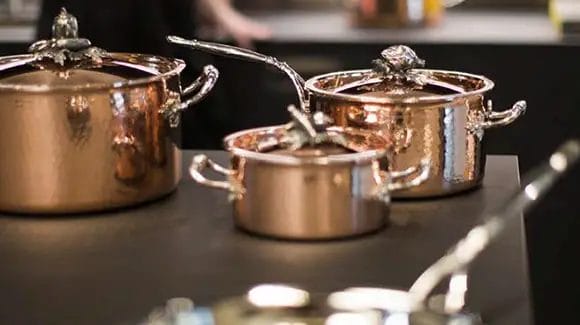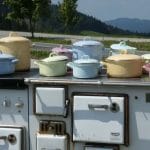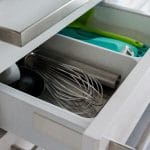When equipping your kitchen with the best cookware, it’s crucial to consider the material your pots and pans are made from. The debate between copper and stainless steel cookware is an enduring one. To make an informed decision, you need to delve into the pros and cons of each material and factor in the level of care you’re willing to extend to your cookware.
Perks of Copper and Stainless Steel Cookware
Copper cookware is celebrated for:
- Its aesthetic appeal
- Rapid and even heating
- Facilitating precise temperature control
- Its antimicrobial properties, contributing to kitchen hygiene
Stainless steel cookware is lauded for:
- Its impressive durability
- Its non-reactive nature
- Being dishwasher-safe
- Its ability to brown food and de-glaze the pan for creating rich sauces
For enhanced heat conductivity, opt for stainless steel cookware with an internal layer of aluminum or copper.
Drawbacks of Copper and Stainless Steel Cookware
Despite its many advantages, copper cookware has a few drawbacks:
- It reacts to acidic food, causing gray streaks and a metallic taste in the food.
- Requires regular maintenance, like polishing
- Prone to denting and scratching
- It’s not compatible with ceramic glass-top stoves
- Tends to be more expensive
On the other hand, stainless steel cookware:
- Often has hot spots due to uneven heat distribution, risking burnt food.
- Can cause food to stick, complicating the cleaning process.
- Can rust due to constant exposure to moisture.
Making the Purchase
When purchasing copper cookware, consider the thickness and lining of the pots. Pots with a thickness of at least 2.5mm are ideal for even heat conduction, while lined cookware can prevent many issues commonly associated with copper.
For stainless steel cookware, ensure it’s marked 18/10, signifying it contains 18% chromium and 10% nickel to resist stains and rust. Sturdy lids and handles are a must. For better heat conductivity, consider cookware lined with copper or equipped with an aluminum core.
Understanding the benefits and drawbacks of both copper and stainless steel cookware will empower you to make an informed decision. Remember to consider your cooking frequency, your culinary preferences, and your budget when choosing your new cookware.
Frequently Asked Questions (FAQs)
Yes, copper cookware is generally safe to use. However, it should be lined with another metal like tin or stainless steel, as food should not come in contact with pure copper. Moreover, copper is sensitive to acidic foods, which can result in the metal leaching into your meal.
On its own, stainless steel does not distribute heat as evenly as copper or aluminum. However, many high-quality stainless steel pots and pans come with a core or base of copper or aluminum to improve heat distribution.
Stainless steel cookware tends to be more durable than copper. It is more resistant to scratches, dents, and can withstand harsh cleaning methods.
Copper cookware is expensive due to the cost of the raw material itself, as well as the craftsmanship involved in manufacturing. Moreover, copper is an excellent heat conductor, which adds to its value.
Yes, most stainless steel cookware is dishwasher safe. However, it’s always a good idea to check the manufacturer’s instructions before putting it in the dishwasher.
Look for stainless steel cookware labeled 18/10. This means it contains 18% chromium and 10% nickel, which helps resist stains and rust. Additionally, make sure the lids and handles are sturdy and that the cookware has a copper or aluminum core for better heat conductivity.
Copper cookware requires regular polishing to maintain its look. It’s best to hand wash copper cookware and avoid abrasive cleaners to prevent scratching the surface. Copper pans lined with tin may require retinning over time.
It’s generally recommended not to use copper cookware on ceramic glass-top stoves, as they can leave marks on the stove surface.





